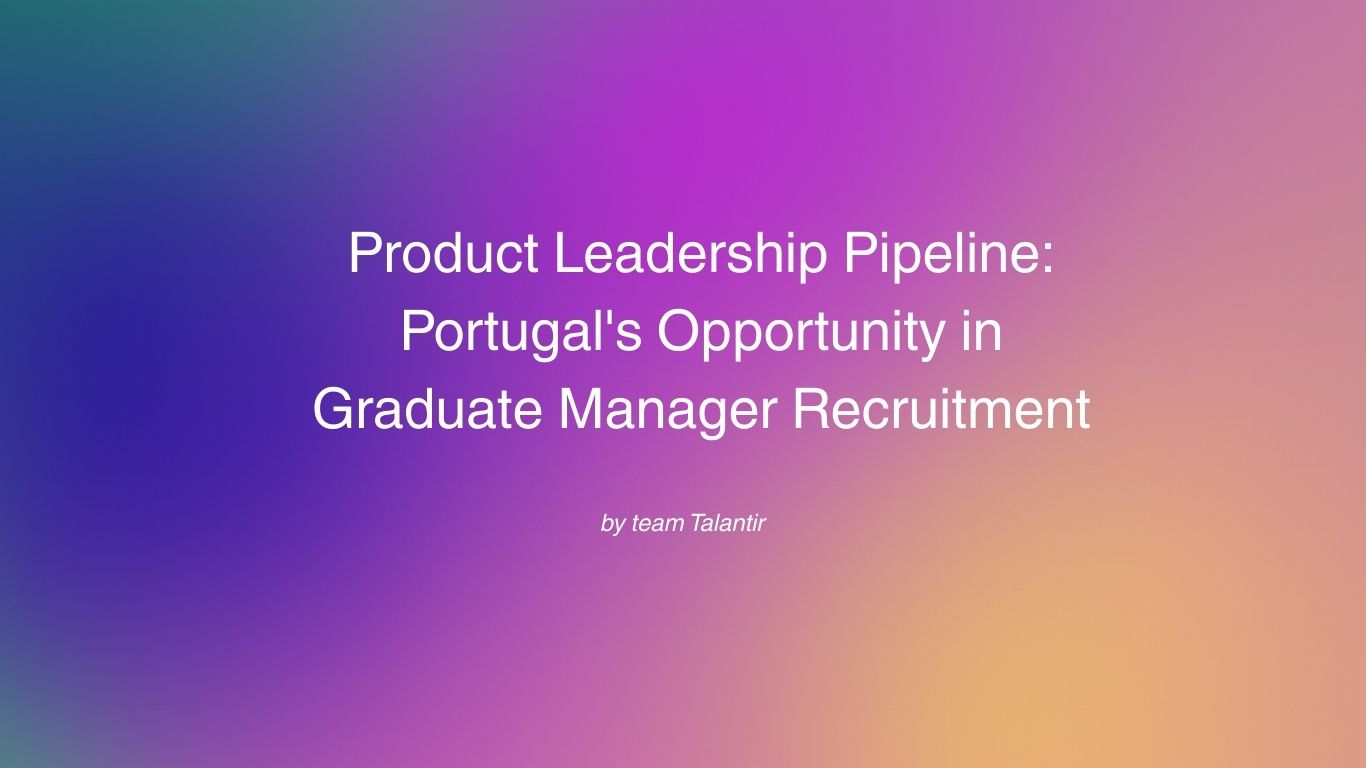Introduction: Why Entry-Level Product Hiring Feels Broken
Portugal’s tech job market shows growing demand for Product Managers, yet opportunities for fresh entrants remain limited. In 2025, according to Glassdoor there were 2,123 Product Manager roles listed in Portugal, but only 158 were junior-level openings. This imbalance creates unlocked ambition and limited entry points.
Moreover, Portugal recorded an employment rate of 72.4% in 2023, above the EU average, yet many young job seekers still struggle to secure relevant early-career roles. Universities are racing to integrate product management fundamentals into curricula, but traditional learning often lags behind fast-changing industry expectations.
The result is systemic friction: students launch multiple applications with scant feedback, employers sift through CVs without clear signals, and universities scramble to align theory with practice.
Talantir believes in a better way: evaluate real capability through practical work samples—not just polished résumés.
Current Frictions in Early-Career Product Manager Hiring
Application Volume
Junior Product Manager roles are few and highly competitive. Resumes with generic team project experience or frameworks often flood the applicant pool, burying those with practical potential.
Time to Hire
Although Portugal-specific time-to-hire data for product roles is scarce, tech hiring cycles generally remain slow. Structural lag collides with the iterative speed product work demands, leaving students waiting and employers losing momentum.
Skills Mismatch
Even as AI and digital product tools dominate, many graduates lack hands-on experience prioritizing features, handling stakeholder trade-offs, or writing concise product briefs. Employers value execution but graduates often finish programs without practice in these areas.
Poor Signal Quality
CVs don’t reveal judgment, prioritization, or clarity of vision. Interviews often reward communication polish rather than decision-making skills. Employers make hiring bets on incomplete information.
Assessment Drift
Companies often use logic puzzles or abstract business cases. These tests rarely mirror the day-to-day responsibilities of a Product Manager, such as balancing user needs with business trade-offs.
Why Product Management Roles Are Hard to Evaluate Early
Product roles require a unique blend of skills: analytical thinking, empathy for users, and the ability to manage stakeholders. Few graduates leave school with all of these. Practices evolve rapidly, so what universities teach may be outdated by graduation. Job titles like "Product Owner" or "Associate PM" differ widely across organizations, confusing candidates and employers alike. Finally, because poor product decisions can derail teams, employers are cautious, relying on proxies such as brand-name schools or certifications instead of demonstrated capability.
The Alternative: Work-Sample Evaluation
Work-sample assessments create a clearer path. Instead of abstract exercises, employers can ask candidates to complete short, realistic tasks that mirror day-one responsibilities.
For Product Managers, examples include:
- Prioritizing a short feature backlog with limited customer data
- Drafting a one-page product requirements document (PRD)
- Writing user stories for a hypothetical feature
- Outlining trade-offs between two roadmap scenarios
These tasks take 30–90 minutes and reveal decision-making, clarity, and communication far more effectively than a CV.
Benefits:
- Students gain an equal chance to prove readiness.
- Employers see direct evidence of judgment and prioritization.
- Universities can align coursework with industry-relevant cases.
Talantir’s Perspective: Capability-First for Product Roles
Talantir is built on a capability-first hiring and readiness model. Students progress through structured roadmaps featuring authentic product challenges before advancing to employer-aligned projects.
For Product Managers, this could include:
- Roadmap cases: drafting PRDs, prioritizing features, creating lightweight discovery tasks.
- Milestones: designing MVP definitions or running mock stakeholder sessions.
- Challenges: employer-aligned cases such as reprioritizing a backlog based on customer feedback.
For students, this builds confidence and clarity while producing a portfolio of real work.
For employers, it reduces reliance on resumes by providing deep, skill-based candidate profiles.
For universities, it embeds industry-aligned exercises with minimal effort while providing analytics on employability.
By centering evaluation on real work, Talantir helps all three groups—students, employers, and educators—close the readiness gap.
Conclusion: What If We Evaluated Real Work, Not Promises?
Early-career hiring for Product Managers in Portugal is defined by systemic friction: too few junior roles, slow hiring cycles, mismatched skills, and weak signals. Traditional methods fail to capture what matters most—whether candidates can think and act like product managers.
Work-sample evaluation provides a reset. By focusing on authentic, manageable tasks, employers see stronger signals, students gain fair opportunities, and universities better prepare graduates for real demands.
What if we evaluated real work, not promises? That’s the reset Talantir puts at the heart of early-career hiring.
Explore how work-sample evaluation can reset early-career hiring standards.
